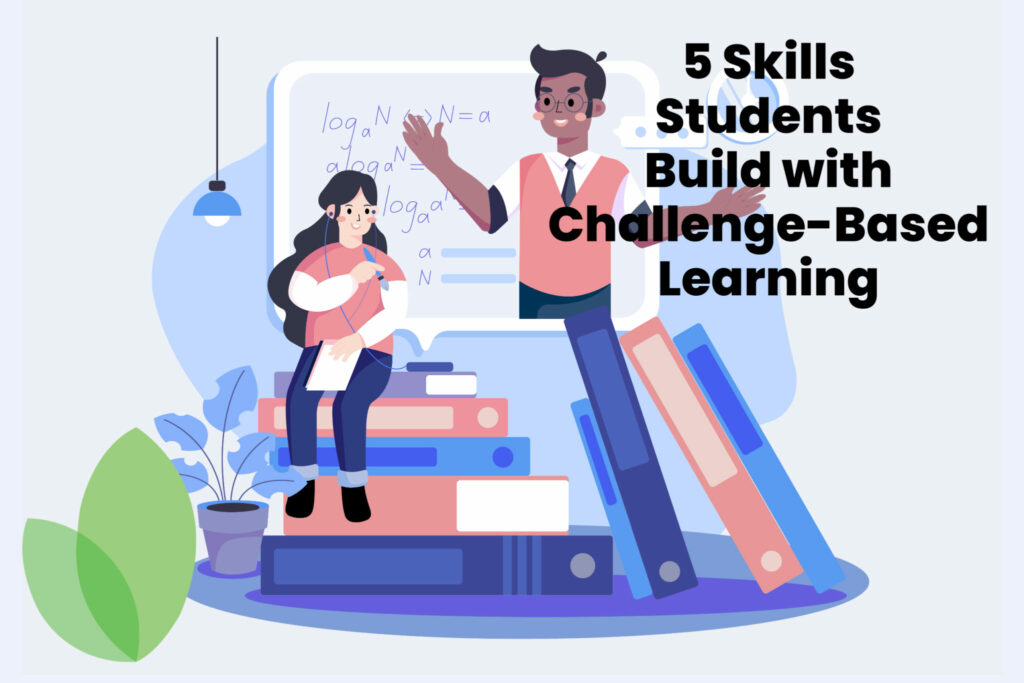One of the largest and most apparent benefits of challenge-based learning is the engaging skill-building experience. Students gain confidence and abilities that can be used in everyday life, in addition to school and work. As challenge-based learning is ultimately a problem-solving process, some of the main skills gained are creative problem solving and critical thinking. Using this as a teamwork exercise, students also gain collaboration and communication skills. Moreover, students are able to gain innovation skills as well as key digital skills.
These five sets of skills are all future-proof (unable to be automated and predicted to remain in demand) and encourage students to gain a holistic professional identity for the future of work.
CREATIVE PROBLEM SOLVING
It should come as no surprise that creativity is in high demand in this digital, innovative age. In fact, creativity was listed as the top in-demand soft skill in LinkedIn’s 2020 study. Challenge-based learning heavily emphasizes creative ways of thinking because innovation is the core of real-world problem-solving. The challenges are designed to inspire creativity in students as they work towards finding an original solution in a group of unique peers.
In Apple’s case studies on challenge-based learning for students, the researchers found that students gained demonstrable creative thinking skills and demonstrated more interest and confidence in their creativity. Before CBL, less than 15% of students felt that they were creative contributors or that they enjoyed being creative contributors; after the process, 88% of students reported that they are creative and that they enjoy being creative contributors.
Likewise, a 2018 study conducted on medical university students found that challenge-based learning significantly improved their creative consciousness levels and their ability to implement creative innovations. These real-world studies highlight the effectiveness of challenge-based learning for nurturing creativity, the top in-demand soft skill today.
CRITICAL THINKING
Going hand-in-hand with creative problem solving, critical thinking is the ability to observe and analyze in order to craft workable solutions and develop new ideas. As such, it is a highly in-demand skill today, and challenge-based learning is an effective method of practicing and gaining critical thinking skills. Education experts at Queen’s University recommend that problem-solvers do so by observing and analyzing facts and data, reflecting on observed experiences, and drawing reasonable conclusions that lead to practical solutions.
Challenge-based learning gives students a firsthand understanding of critical thinking skills and how to apply them in real-world situations to produce meaningful results. When critical thinking is combined with creative thinking in challenge-based experiences, students learn how to innovate.
COLLABORATION SKILLS
Also core to challenge-based learning is collaboration. Evidence consistently represents the effectiveness of collaboration for developing soft skills like emotional intelligence, leadership, negotiation, and conflict resolution. These collaborative skills are valuable in nearly any industry or position. As such, students should absolutely have the opportunity to gain these skills with an enriching, hands-on group project. As students are paired with other unique, diverse minds, they teach one another during their teamwork and motivate each other to work hard and innovate successfully.
A study conducted by Indiana State University with business students highlighted the effectiveness of challenge-based learning because of its collaboration element. The problem-solving collaboration experienced in challenge-based learning reaps a greater host of benefits than traditional collaboration exercises or traditional problem-solving exercises can achieve on their own. The students in this post-secondary study gained invaluable collaborative skills because of the problem-solving they were challenged with. They also gained problem-solving skills through the collaborative experience.
COMMUNICATION SKILLS
Along with collaboration skills, students learn critical communication skills; both are verbal and written and both are top, in-demand skills employers look for when hiring entry-level candidates. The interpersonal element of challenge-based learning forces students to learn how to communicate clearly because, without clear communication, they will be unsuccessful in their collaborative project. Moreover, challenge-based learning requires students to clearly articulate their solution once it is complete, often requiring them to write about their innovative solutions. In doing so, students practise their communication skills in both the interpersonal work environment and the external presentation of their work.
A Mississippi State University study on BioMed engineering post-secondary students demonstrated this impact of challenge-based learning on students’ written and verbal communication skills. After completing collaborative problem-solving projects, the students demonstrated significant improvements in their essential communication skills.
DIGITAL SKILLS
Lastly, challenge-based learning emphasizes digital literacy and skills, which are, unsurprisingly, essential in today’s job market. Although youth today are ‘digital natives,’ many still lack foundational digital skills that could advance their career potential for the future.
Digital literacy skills range from using basic applications like Microsoft Word to coding, video editing, and graphic design. Regardless, in any career students choose in the future, technology will be relevant in even the most traditional entry-level roles, as everything now involves some use of technology.
Through challenge-based learning, students strengthen their digital literacy. Notably, the origin of challenge-based learning was an attempt to modernize and future-proof education with the use of digital tools. As such, it is an ideal method for students to gain digital literacy skills while also developing creative, analytical, and interpersonal skills. We Forum’s Schools of the Future report also highlighted this crucial role that digital tools play in innovative learning.
The above five skill sets are essential to nurturing in students today. The future of work depends on today’s youth honing these skills, and as such, educators have an important duty in guiding their students towards challenge-based success.
You can read more about innovative approaches to education in our blog post: Innovation in Education.

